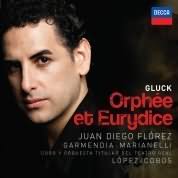Because Louis XVI and the French disliked the castrato sound, Gluck re-wrote his 1762 opera for high, light tenor; in keeping with French taste he also added more ballet sequences. I’ve always loved this 1774 version of Gluck’s opera, and still treasure the 1956 Philips recording led by Hans Rosbaud and starring the inimitably elegant Leopold Simoneau. This new version, with superstar tenor Juan Diego Florez, recorded live at Madrid’s Teatro Real in the spring of 2008, simply can’t compare with it.
Florez’s voice sits admirably high for this haute-contre version, and he includes the rarely-heard bravura, coloratura-filled aria that ends Act 1 (which Simoneau does not), which he sings with show-stopping virtuosity. But Florez’s Mediterranean, somewhat nasal delivery does not suit the music; it requires a less muscular sound. Because he is such a great singer I might have been able simply to appreciate what easy going he makes of it, but I get no feeling of any introspection; both his unhappiness and desperation sound as if they come from the vocal equivalent of central casting.
Orphée’s nobility and grace are in little evidence; he is unhappy, he is angry. “J’ai perdu mon Eurydice” is handsomely sung, but it is here, oddly, that conductor Jesus López-Cobos seems to be marking time. Elsewhere, the reading is almost unabashedly early-Romantic (which the opera is not), with violins refusing to attack with bite and brass seemingly there for decoration.
Both sopranos are serviceable but do not make a great impression. Not that it would matter if they did; this is the tenor’s opera (with help from conductor and orchestra), and for once, Florez has let us down.
































